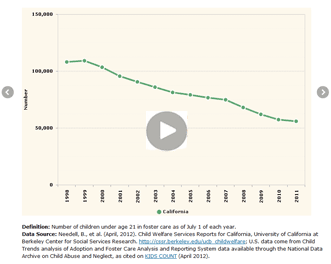Health Care Remains Significant Issue for Children in Foster Care
As noted in a recent kidsdata advisory, several state policy changes and budget decisions as well as the upholding of the national Affordable Care Act (PPACA) signal potential improvements to California’s foster care system, particularly by extending services for those close to “aging out” of care. As these changes progress, it will be important to monitor access to health insurance and health care for the state’s 56,000 foster children and youth. If Medicaid is extended to all low-income adults, these youth may then have a source of coverage. Alternatively, the State might take its lead from the PPACA and extend Medicaid eligibility to age 26 for children previously covered by that program.
National interest in the health care of children in foster care began to take shape in the early 1980s when newly implemented systematic assessments documented high rates of chronic illness, developmental delays and mental illness, as well as poor access to preventive care for foster children. Toward the end of the decade, the Child Welfare League of America published the first standards for health care for these children.
While the child welfare system has improved over the intervening decades, with more families receiving services to prevent removal of children from their homes, and children returning home earlier, health care remains a significant issue. Rates of special health care needs are high among children who enter foster care, even after controlling for social-demographic factors. Unmet needs are greatest for services that address behavioral health disorders resulting from both the circumstances that led to their being placed in care as well as the impermanence that frequently characterizes care. These services, especially child mental health services, are notoriously unavailable.
The State of California has responded to the complex health needs of foster children in care by excusing them from mandatory enrollment in Medicaid managed care programs, and allowing them to enroll in fee-for-service plans, except in counties that have a county organized health system. Consequently, the majority of California foster children receive their health care through the state’s Medi-Cal program. However, there is no evidence that this approach is advantageous to the children. Their care is often fragmented by the instability of their placements, and many caseworkers lack knowledge about health issues or how to coordinate care within a fee-for-service system. Further, Medi-Cal’s low reimbursement rates severely limit foster children’s access to necessary health care services.
The fragility of foster children, their tenuous legal status and supervision, and the complexity and multiplicity of their health problems call for special attention to their health care by both the child welfare and child health care systems. Typical, busy child health care practices are unlikely to be able to devote adequate time to meet the needs of foster children, so a different model of care is needed. A system that ensures close adherence to recommended preventive measures, along with ongoing coordination of medical, mental health, developmental, educational and social services, is necessary if the long-term health outcomes of foster children and youth are to be improved. Other high-risk children, many of whom receive their care through publicly financed systems such as Medi-Cal, require and would benefit from a similarly integrated, comprehensive and accountable care system. Statewide health care reform for children with special health care needs is needed to assure their optimal health and well-being.
For more information about foster care, including web resources, research, and key reports, see kidsdata.org’s Research & Links section.
Posted by Ed Schor, MD
This entry was posted on Monday, July 30th, 2012 at 11:43 am. You can follow any responses to this entry through the RSS 2.0 feed. You can leave a response, or trackback from your own site.



